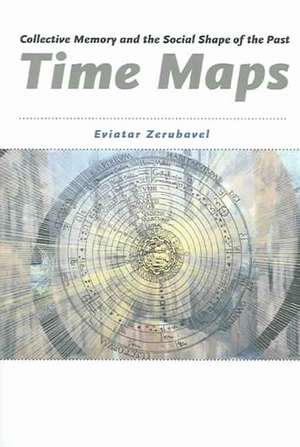Time Maps: Collective Memory and the Social Shape of the Past
Autor Eviatar Zerubavelen Limba Engleză Paperback – noi 2004
"Time Maps extends beyond all of the old clichés about linear, circular, and spiral patterns of historical process and provides us with models of the actual legends used to map history. It is a brilliant and elegant exercise in model building that provides new insights into some of the old questions about philosophy of history, historical narrative, and what is called straight history."-Hayden White, University of California, Santa Cruz
Who were the first people to inhabit North America? Does the West Bank belong to the Arabs or the Jews? Why are racists so obsessed with origins? Is a seventh cousin still a cousin? Why do some societies name their children after dead ancestors?
As Eviatar Zerubavel demonstrates in Time Maps, we cannot answer burning questions such as these without a deeper understanding of how we envision the past. In a pioneering attempt to map the structure of our collective memory, Zerubavel considers the cognitive patterns we use to organize the past in our minds and the mental strategies that help us string together unrelated events into coherent and meaningful narratives, as well as the social grammar of battles over conflicting interpretations of history. Drawing on fascinating examples that range from Hiroshima to the Holocaust, from Columbus to Lucy, and from ancient Egypt to the former Yugoslavia, Zerubavel shows how we construct historical origins; how we tie discontinuous events together into stories; how we link families and entire nations through genealogies; and how we separate distinct historical periods from one another through watersheds, such as the invention of fire or the fall of the Berlin Wall.
Most people think the Roman Empire ended in 476, even though it lasted another 977 years in Byzantium. Challenging such conventional wisdom, Time Maps will be must reading for anyone interested in how the history of our world takes shape.
Who were the first people to inhabit North America? Does the West Bank belong to the Arabs or the Jews? Why are racists so obsessed with origins? Is a seventh cousin still a cousin? Why do some societies name their children after dead ancestors?
As Eviatar Zerubavel demonstrates in Time Maps, we cannot answer burning questions such as these without a deeper understanding of how we envision the past. In a pioneering attempt to map the structure of our collective memory, Zerubavel considers the cognitive patterns we use to organize the past in our minds and the mental strategies that help us string together unrelated events into coherent and meaningful narratives, as well as the social grammar of battles over conflicting interpretations of history. Drawing on fascinating examples that range from Hiroshima to the Holocaust, from Columbus to Lucy, and from ancient Egypt to the former Yugoslavia, Zerubavel shows how we construct historical origins; how we tie discontinuous events together into stories; how we link families and entire nations through genealogies; and how we separate distinct historical periods from one another through watersheds, such as the invention of fire or the fall of the Berlin Wall.
Most people think the Roman Empire ended in 476, even though it lasted another 977 years in Byzantium. Challenging such conventional wisdom, Time Maps will be must reading for anyone interested in how the history of our world takes shape.
Preț: 184.03 lei
Nou
Puncte Express: 276
Preț estimativ în valută:
35.22€ • 36.49$ • 29.39£
35.22€ • 36.49$ • 29.39£
Carte disponibilă
Livrare economică 28 februarie-14 martie
Livrare express 13-19 februarie pentru 21.47 lei
Preluare comenzi: 021 569.72.76
Specificații
ISBN-13: 9780226981536
ISBN-10: 0226981533
Pagini: 187
Ilustrații: 1 line drawing, 23 figures
Dimensiuni: 152 x 229 x 18 mm
Greutate: 0.3 kg
Ediția:1
Editura: University of Chicago Press
Colecția University of Chicago Press
ISBN-10: 0226981533
Pagini: 187
Ilustrații: 1 line drawing, 23 figures
Dimensiuni: 152 x 229 x 18 mm
Greutate: 0.3 kg
Ediția:1
Editura: University of Chicago Press
Colecția University of Chicago Press
Notă biografică
Eviatar Zerubavel is a professor of sociology at Rutgers University. He is the author of seven other books, including Social Mindscapes: An Invitation to Cognitive Sociology, The Seven-Day Circle: The History and Meaning of the Week, and The Fine Line: Making Distinctions in Everyday Life.
Cuprins
List of Figures
Preface
Introduction- The Social Structure of Memory
1 - THE SOCIAL SHAPE OF THE PAST
Plotlines and Narratives
Progress
Decline
A Zigzag in Time
Ladders and Trees
Circles and Rhymes
Mountains and Valleys
Legato and Staccato
2 - HISTORICAL CONTINUITY
Same Place
Relics and Memorabilia
Imitations and Replication
"Same" Time
Historical Analogy
Discursive Continuity
3 - ANCESTRY AND DESCENT
Dynasties and Pedigree
Common Descent
The Social Organization of Descent
The "Family of Man"
Apes and Grapes
Language and Lineage
4 - HISTORICAL DISCONTINUITY
The Social Punctuation of the Past
Assimilation and Differentiation
History and Prehistory
The Social Construction of Historical Discontinuity
5 - IN THE BEGINNINGS
Antiquity
Priority
Notes
Bibliography
Author Index
Subject Index
Preface
Introduction- The Social Structure of Memory
1 - THE SOCIAL SHAPE OF THE PAST
Plotlines and Narratives
Progress
Decline
A Zigzag in Time
Ladders and Trees
Circles and Rhymes
Mountains and Valleys
Legato and Staccato
2 - HISTORICAL CONTINUITY
Same Place
Relics and Memorabilia
Imitations and Replication
"Same" Time
Historical Analogy
Discursive Continuity
3 - ANCESTRY AND DESCENT
Dynasties and Pedigree
Common Descent
The Social Organization of Descent
The "Family of Man"
Apes and Grapes
Language and Lineage
4 - HISTORICAL DISCONTINUITY
The Social Punctuation of the Past
Assimilation and Differentiation
History and Prehistory
The Social Construction of Historical Discontinuity
5 - IN THE BEGINNINGS
Antiquity
Priority
Notes
Bibliography
Author Index
Subject Index















